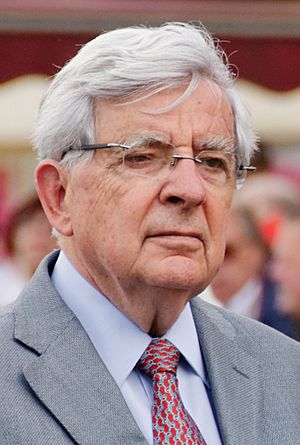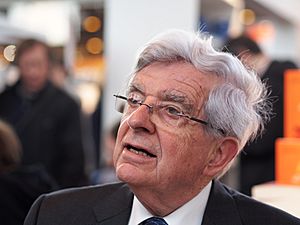Jean-Pierre Chevènement facts for kids
Quick facts for kids
Jean-Pierre Chevènement
|
|
|---|---|
 |
|
| Minister of the Interior | |
| In office 4 June 1997 – 29 August 2000 |
|
| Prime Minister | Lionel Jospin |
| Preceded by | Jean-Louis Debré |
| Succeeded by | Daniel Vaillant |
| Minister of Defence | |
| In office 12 May 1988 – 29 January 1991 |
|
| Prime Minister | Michel Rocard |
| Preceded by | André Giraud |
| Succeeded by | Pierre Joxe |
| Minister of National Education | |
| In office 17 July 1984 – 20 March 1986 |
|
| Prime Minister | Laurent Fabius |
| Preceded by | Alain Savary |
| Succeeded by | René Monory |
| Minister of Research and Industry | |
| In office 22 May 1981 – 23 March 1983 |
|
| Prime Minister | Pierre Mauroy |
| Preceded by | Pierre Aigrain |
| Succeeded by | Laurent Fabius |
| Personal details | |
| Born | 9 March 1939 Belfort, Territoire de Belfort |
| Political party | SFIO (1964–1969) PS (1969-1993) MDC (1993–2002) Republican Pole (2002–2003) MRC (2003–2015) |
| Spouse | Nisa Chevènement |
| Children | Raphaël and Jean-Christophe |
| Alma mater | Sciences Po École nationale d'administration |
| Website | [1] |
Jean-Pierre Chevènement, born on March 9, 1939, is a well-known French politician. He served as a minister in the French government during the 1980s and 1990s. He is also remembered for running in the 2002 French presidential election.
Before becoming a senator, he was the mayor of Belfort. In 2008, he was elected to the Senate for the Territoire de Belfort area. Jean-Pierre Chevènement helped start the Socialist Party (PS). Later, he founded the Citizen and Republican Movement (MRC). He is an important figure in French politics, especially on the left side.
Contents
About Jean-Pierre Chevènement
Early Life and Background
The Chevènement family originally came from Switzerland. Their last name, Schwennemann, was changed to Chevènement in the 1700s to sound more French. Jean-Pierre Chevènement was born in Belfort, a town close to the Swiss border. He can speak German and studied in Vienna, Austria.
Starting His Political Journey
Jean-Pierre Chevènement's political ideas are unique. He combines left-wing views with a strong sense of national pride. He calls his position "republican" because he believes in a strong, united France.
He was the Mayor of Belfort for many years, from 1983 to 2008. He also served as a Deputy in the National Assembly, which is like a member of parliament, from 1973 to 2002.
He first joined a political party called the French Section of the Workers' International (SFIO). There, he created a group called the Center for Socialist Studies, Research and Education (CERES). This group was the left-leaning part of the SFIO. They wanted to work closely with the French Communist Party.
In 1969, the SFIO party changed and became the Socialist Party (PS). A few years later, CERES helped François Mitterrand take over the leadership of the PS. CERES played a big part in planning the Socialist Party's successful election campaign in 1981.
Serving in Government Roles
Jean-Pierre Chevènement became the Minister of Research and Industry in 1981. He held this role until 1983, when he resigned. This was the first of three times he would leave a government position. He disagreed with a new economic policy that President Mitterrand put in place. This policy was meant to keep France in the European Monetary System. He once said that a minister should keep quiet, or resign if they want to speak out. However, he returned to the government as the Minister of National Education from 1984 to 1986.
In 1988, he was appointed Minister of Defence. He stayed in this role until 1991. He resigned because he did not agree with Operation Desert Storm, a military operation. He felt it went beyond what the United Nations had allowed. After this, he opposed the Maastricht Treaty, which was about creating a closer European Union. President Mitterrand and the Socialist Party strongly supported this treaty. In 1993, Chevènement left the Socialist Party and started his own new political party, the Citizens' Movement (MDC).
Chevènement and his MDC party joined a group of left-wing parties called the Plural Left. When this group won the 1997 election, he became the Minister of the Interior. This was in the government led by Lionel Jospin. In September 1998, Chevènement had surgery. He had a serious allergic reaction to the medicine used for the surgery and was in a coma for 8 days. He slowly recovered and left the hospital in October. He could not return to work for four more months. Because of this amazing recovery, people nicknamed him "the miracle of the republic."
For the third time, Chevènement resigned from the government in 2000. This time, it was because he disagreed with giving more independence to Corsica. He also wanted to prepare to run for president in the 2002 elections.
The 2002 Presidential Election
Jean-Pierre Chevènement ran in the 2002 French presidential election. He presented himself as a leader for "republicans." He wanted to stand against what he called the "Chirac/Jospin duo." He created a group called the Republican Pole for people who had more left-wing nationalist views. He received 5% of the votes. Many Socialists believed that Chevènement's candidacy caused their candidate, Lionel Jospin, to lose in the first round of the election.
Because of this, in the June 2002 election, the Socialist Party supported a different candidate against him in his home area of Belfort. He lost his seat in parliament to the candidate from the Union for a Popular Movement (UMP) party.
Citizen and Republican Movement
After the 2002 election, the Republican Pole group split up. Chevènement then created the Citizen and Republican Movement (MRC). This party described itself as a left-wing party. He later became friends with the Socialist Party again. He had thought about running for president again, but instead, he decided to support Ségolène Royal in the 2007 election. Even with the Socialist Party's support, he did not win back his parliamentary seat in the 2007 election. He then announced that he would not run for Mayor of Belfort again.
In 2004, he started a group called the "Res Publica" Foundation. This foundation aims to promote the 'republican model' and to create a long-term political vision for France. Chevènement has stated that Res Publica is not a political party.
In the Senate election held on September 21, 2008, Chevènement was elected as a Senator for the Territory of Belfort. He won against the Socialist candidate, Yves Ackerman. In June 2014, he announced that he would not run in the 2014 Senate election. He also tried to be a candidate for the presidential election of 2012.
Jean-Pierre Chevènement's Political Views
Jean-Pierre Chevènement is known as a "souverainist" and a patriotic left-wing politician. This means he believes in the importance of national independence and pride. He is sometimes called a "left-wing Gaullist," referring to the ideas of former French President Charles de Gaulle.
He is against European federalism. This is because he worries it could make nations disappear and create a European government run by people who are not elected. He wants the single European currency, the Euro, to become a common currency. This would allow countries to better control their own economies. It would also help the EU speak with one voice in the world. He has pointed out that a strong euro has caused problems for countries like Greece, Italy, Spain, and Portugal.
When he was in government, he supported France's special position in NATO. This meant France was not part of NATO's combined military command. He was against France rejoining this command in 2009.
He also strongly believes in the separation of church and state. He supports the idea of a united nation-state and is against communitarianism, which is when different groups within a society keep their own separate identities. Instead, he supports cultural assimilation, where people adopt the main culture of the country.
Jean-Pierre Chevènement's Career Timeline
Government Roles
- Minister of State, Minister of Research and Technology: 1981–1982
- Minister of State, Minister of Industry Research: 1982–1983
- Minister of National Education: 1984–1986
- Minister of Defense: 1988–1991
- Minister of Interior: 1997–2000
Elected Positions
National Assembly of France
He was a Member of the National Assembly of France for Territoire de Belfort from 1973 to 1981, 1986 to 1988, 1991 to 1997, and 2000 to 2002.
Senate of France
He served as a Senator for Territoire de Belfort from 2008 until 2014.
Regional Council
He was the President of the Regional Council of Franche-Comté from 1981 to 1982. He was also a Regional Councillor for Franche-Comté from 1974 to 1988.
Municipal Council
He was the Mayor of Belfort from 1983 to 1997 and again from 2001 to 2007. He also served as the 1st Deputy-Mayor of Belfort from 1977 to 1983 and 1997 to 2001. He was a Municipal Councillor of Belfort from 1977 to 2008.
Agglomeration Community Council
He was the President of the Agglomeration community of Belfort from 1977 to 2008. He was also a Member of the Agglomeration community of Belfort from 1977 to 2008.
Political Party Roles
- President of the Citizen and Republican Movement: 2008–2015
See also
 In Spanish: Jean-Pierre Chevènement para niños
In Spanish: Jean-Pierre Chevènement para niños


